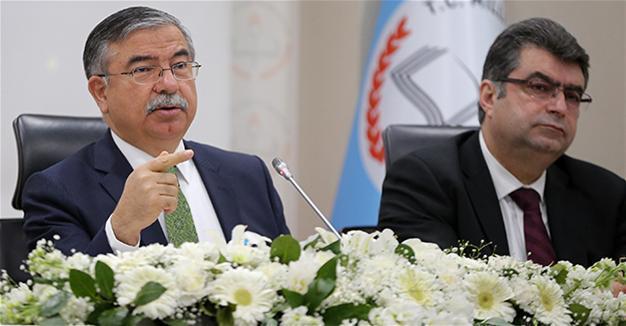Education Ministry introduces new draft curriculum, asks people to contribute
ANKARA

AA photo
Turkey’s Education Ministry has introduced a draft curriculum that will cover all 51 compulsory classes that are taught in elementary, middle and high schools to the public opinion, while establishing a platform in which people will be able to leave comments and make contributions.
Announcing the program on its website on Jan. 13, the ministry shared its renewed draft work for the curriculum that is expected to be implemented by the upcoming education year to begin in September 2017 and which makes a number of changes to the current system amid criticisms.
According to the plan, the platform will be open until Feb. 10 and will enable people to contribute and share their opinions for all classes except religion and morality classes. After soliciting the comments that are expected to come from students, teachers, parents and education experts, a corresponding commission at the Education Ministry will re-evaluate its draft and finalize its work by Feb. 20. The process will then be followed with the writing of new textbooks.
The main set of contents of the draft curriculum include topics such as “historical conscience,” “healthy living and aging,” “July 15 democracy victory,” “21st-century skills,” “Kemalism,” “Education of Values,” “National Education Quality Certificate,” “Turkey Competencies Frame” and “Living Skills.”
The new program is set to provide less academic information for students.
Subjects like the country’s historic, cultural, social and moral past will be covered from the perspective of national and moral education.
The draft curriculum was designed in coordination with the content of centralized examinations such as the Trends in International Mathematics and Science Study (TIMSS), the OECD’s Programme for International Student Assessment (PISA) and Transition from Primary to Secondary Education (TEOG). As the content of those tests change, the curriculum will also be updated.
The education program will also introduce foreign language preparatory classes after fifth grade, with some 500 schools in 81 provinces to be designated as pilot areas in the transition period.
The new system seeks to give students knowledge in areas of emotional control, respect for differences, trust, communication, use of resources, self-expression, self-protection, self-identification, obeying of rules, comprehending space, recognizing national and cultural values, self-respect, love, respect, responsibility and social participation.
History classes, which currently cover Turkish history until World War II, will be expanded to cover the history of the republic form 1950 to 2016 and in its teaching of recent history, the emphasis will be given to the July 2016 coup, the “protection of the national will,” the EU candidacy process and the Cyprus talks.
Math classes will also bear some changes as algebra, geometry, data processing and probability will be covered more intensely in middle school grades. The classes will be taught in a way to enable students to use concrete teaching materials, games, activities and daily life problems. Information technology and information software subjects will also be encouraged in math classes.
In sciences the scope will be on scientific, technological and environmental literacy skills for students. Works that will develop coding skills will also be introduced to students from the first grade.
In science, the order of subjects will be changed so that students study astronomy (universe and earth), biology, physics and chemistry in succession.
In addition to science classes, engineering skills classes will also be introduced from fourth grade.
Experts, meanwhile argue that the new curriculum bears serious shortcomings.
Eğitim-İş Union – an education union – head Mehmet Balık said the subject of tolerance that is to be introduced under the titles of values from the fourth grade is an attempt to underpin religious education.
